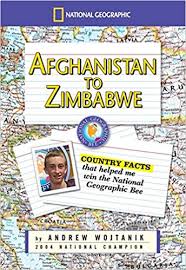From Afghanistan to Zimbabwe
Listen to the Recess! Clip
| Author | John Cech |
| Air Date | 11/7/2005 |

From Afghanistan to Zimbabwe Transcript
It’s Geography Awareness Week, and already young people around the country are gearing up for the big National Geographic Bee in which students from fourth through eighth grades test their knowledge of the world’s geography each year. More than 5 million young people participate through their schools. The finals are held in May, and the winner receives a $25,000 college scholarship. Here is what you would have had to answer to win the 2004 contest: “Peshawar, a city in the North-West Frontier Province of Pakistan, has had strategic importance for centuries because of its location near what historic pass?” Andrew Wojtanik, an eighth grader from Kansas City knew the answer and became the national champion. And the next year he put all of his notes together into a book called Afghanistan to Zimbabwe, a study guide for all those who would like to follow in Andrew’s footsteps.
He took a very disciplined approach, listing the major facts about the 192 countries in the world — from basics like the square miles or meters that they occupy to more esoteric questions, like when they gained their autonomy, their main ethnic groups, the names of their national currencies, and their principle religions and languages. Did you know, for instance, that the African country of Burkina Faso used to be called Upper Volta, that it achieved its independence from France in 1960, and that it is a source for manganese and gold, sesame and cotton? The facts start to tell a story and who knows where they might lead — in the imagination or in reality.
Wojtanik told Alex Trebek, the host of Jeopardy and the moderator for the Bee, the story of how he had prepared for the competition, and about the guide he had written. A few months later, Wojtanik not only had won the championship, but he also had a book contract. As Andrew puts it in his introduction for Afghanistan to Zimbabwe, learning about geography is really about being “willing to expand your horizons and go beyond your boundaries to a place you have never seen before.” You can find out much more about the National Geographic Bee online at Nationalgeographic.com — the site includes other study tips, questions, and resources like the Map Machine with its flags and facts page, as well as information about the GeoBee Challenge board game. So did you remember the name of that pass? You’ll just have to ask Andrew.